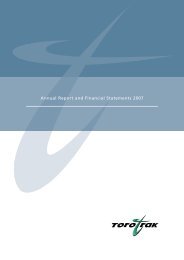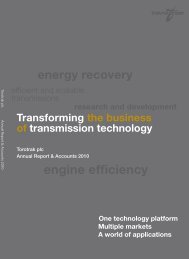Annual report 2004 - Torotrak
Annual report 2004 - Torotrak
Annual report 2004 - Torotrak
- No tags were found...
Create successful ePaper yourself
Turn your PDF publications into a flip-book with our unique Google optimized e-Paper software.
chairman’s statementOver the last financial year, we have achieved our goal ofendorsement of our Infinitely Variable Transmission (IVT)technology at the highest decision making levels in theautomotive industry.The board has been further strengthened by the appointmentof two new non-executive directors from 1 November 2003 -Dr Nick Barter and Mr David MacKay. These appointmentscomplement the executive changes <strong>report</strong>ed in 2003.Both Nick and David bring relevant strategic skills andexperience which have already contributed strongly to ourtransition from technical development to market exploitation.Their in-depth interrogation of the business plan has confirmedthat our strategy and technical approach are correct. ThroughNick’s experience of leading the engineering team at Ford’sPremier Automotive Group in the UK, he has endorsed theemphasis we have placed on relationship management withthe key decision makers in the car industry to develop theirconfidence in our IVT technology. David, formerly ExecutiveVice President and General Counsel for ARM Holdings plc, hasvery recent experience in managing the licensing of worldleadingtechnology. With this experience, he has supported theexecutive team in the strengthening of an already soundintellectual property model to maximise returns on thelicensing of our portfolio.During the year David Burnicle, Malcolm Coster and IanMacpherson stood down as non-executive directors, havingcontributed to <strong>Torotrak</strong>’s technical and strategic developmentas members of the board since flotation in 1998. Ian continuesto advise us in a consultative capacity, testing our engineerswith his inventive experience of powertrain engineering whilstresearching opportunities beyond the first productionapplications of the IVT to maximise <strong>Torotrak</strong>’s relevance tonew, emerging technologies such as hybrids. These changescomplete the reshaping of the board.Since I <strong>report</strong>ed in 2003, the strong pressures on the carcompanies in both Europe and the US to find ways of reducingfuel consumption have reached new heights of intensity. InEurope, ACEA, the industry forum that represents the majorcar, truck and bus manufacturers, had to declare to the EUCommission in early <strong>2004</strong> that it had failed to meet its latestmilestone towards achieving its voluntary improvement target.As this commitment has at its core the high profile Kyotoprotocol, designed to reduce global greenhouse gas emissions,the Commission cannot be seen to allow ACEA to relax thiscommitment.Until early <strong>2004</strong>, when the full year 2002 fuel consumptionresults were <strong>report</strong>ed, ACEA had achieved year on yearimprovement of their fleet average consumption. This was theresult of the sale of more small cars and diesels as well asthe introduction of incremental fuel saving engineeringimprovements. It is now recognised by both the EU Commissionand ACEA that the only solution is to introduce significant fuelsaving technology to meet the target. For the car companies,this means technology that will deliver double-digit percentagefuel savings across their whole product range whilemaintaining economic viability.In the USA, there are identical pressures on the car companiesbut driven by different needs. At the beginning of the Iraq warthe price of petrol went above the $2 per gallon threshold inmany states. What was seen at first as a temporary rise hascontinued for well over a year and shows no sign of returningto earlier levels. With the prospect of this consolidating in thelong term, fuel consumption has become the purchasediscriminator the car companies feared in their push to sell cars,light trucks and sport utility vehicles. Trading down to smallervehicles is not an alternative for their customers who are usedto large vehicles with powerful engines. The car manufacturersin Detroit have had to respond by moving fuel consumptionimprovement towards the top of their planning agendas. Thesemanufacturers now view transmission technology in generalas the most commercially viable way of achieving this fuelconsumption improvement without product compromise.<strong>Torotrak</strong>’s IVT is seen by them as a transmission technology thatcan deliver this improvement, with new and highly marketablefeatures and without compromise.The growing relevance of <strong>Torotrak</strong>’s technology to the major carcompanies has enabled us to develop further the relationshipswith the executives who are responsible for planning anddelivering these solutions. The public endorsement of the IVTsignals that the transmission manufacturers and their carcompany customers now regard our IVT as a robust technical,and commercially attractive, solution.From this strong automotive base <strong>Torotrak</strong> has also begun tobroaden it’s market and product portfolio. The developmentof the off-highway sector as a target market for our variabledrive technology has strengthened our business plan. I amvery encouraged to see the signs of tangible productioncommitment emerging from this work.The last year has seen <strong>Torotrak</strong> grow in stature and credibilityamongst these key customers. Our technology is now acceptedas a key item on their common planning agendas.David WallisChairman24 May <strong>2004</strong>2 <strong>Torotrak</strong> annual <strong>report</strong> & accounts <strong>2004</strong> <strong>Torotrak</strong> annual <strong>report</strong> & accounts <strong>2004</strong> 3





